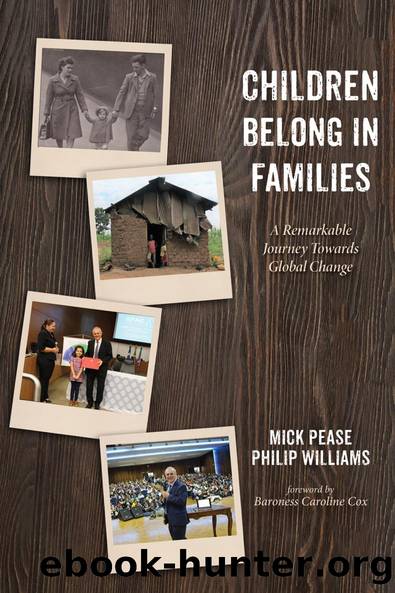Children Belong in Families by Mick Pease Philip Williams

Author:Mick Pease, Philip Williams [Mick Pease, Philip Williams]
Language: eng
Format: epub
ISBN: 9781532644344
Barnesnoble:
Publisher: Wipf & Stock Publishers
Published: 2018-11-07T00:00:00+00:00
Itâs nearing Christmas and the phone rings in the office at Leeds City Council. Itâs another of the calls we get each Christmas, a well-meaning and well-heeled person on the line.
âHave you got a child who could come and spend Christmas with us? Weâll give them the time of their lives. Weâll give them a Christmas they will never forget!â
The child would never forget it alright, but for reasons other than these people expect. Imagine a one- or two-day blast of Christmas cheer and comfort, only for it to end as suddenly as it began? One day you are in a warm, comfortable home which exceeds your wildest dreams. The next, you are whisked away, back to your plain food, your basic living conditions, the lack of adult care and attention. How easy it is to do all the wrong things for all the right reasons! Or for our own benefit, our own glowing sense of self-fulfillment and achievement.
When it comes to residential institutions in tourist spots, there are even worse issues to contend with. Voluntourism fuels the institutionalization and even trafficking of children. It costs money to run a residential institution. You have to feed and clothe the children, pay workers, fund repairs to buildings and equipment. When you are relying on donations from wealthy Westerners, why not invite them in to see the children? They can play with the kids and take selfies to post on social media. It is all part of the experience of international travel, all part of the tour. An orphanage director needs all the funds he or she can obtain. If wealthy Western visitors want to come and play with the children and pay for the privilege, why ignore that opportunity? Yes, it means the orphanage has to be clean and presentable and the children well clothed and fed, otherwise, the visitors will stop coming. But to attract them in the first place requires one essential ingredient; cute and appealing children. Where are they found? If they arenât real orphans or street children, there is only one place they can come from. Their families. In the most extreme cases, recruiters pay families to abandon their children or else persuade them with slick and persuasive presentations. It is a form of modern slavery. At last, it is an issue that governments and legislators are seeking to address.
On April 18, 2018, I attended a briefing in the British Parliament led by Senator Linda Reynolds from Australia.78 British MPs and representatives of charities and NGOs learned about recent measures the Australian government is taking to tackle the issue. The Australian Parliament is the first legislature to identify âorphanage traffickingâ as a category of modern slavery. In 2017 Australiaâs Joint Standing Committee on Foreign Affairs, Defence and Trade defined it as, âthe active recruitment of children from families and communities into residential care institutions . . . for the purpose of foreign funding and voluntourism.â79 Anti-modern slavery and trafficking legislation is going through the Australian Parliament at the time of writing.
Download
This site does not store any files on its server. We only index and link to content provided by other sites. Please contact the content providers to delete copyright contents if any and email us, we'll remove relevant links or contents immediately.
| Military | Political |
| Presidents & Heads of State | Religious |
| Rich & Famous | Royalty |
| Social Activists |
Waking Up in Heaven: A True Story of Brokenness, Heaven, and Life Again by McVea Crystal & Tresniowski Alex(37785)
Empire of the Sikhs by Patwant Singh(23072)
We're Going to Need More Wine by Gabrielle Union(19034)
Hans Sturm: A Soldier's Odyssey on the Eastern Front by Gordon Williamson(18571)
Leonardo da Vinci by Walter Isaacson(13315)
The Radium Girls by Kate Moore(12017)
Tools of Titans by Timothy Ferriss(8363)
Educated by Tara Westover(8045)
How to Be a Bawse: A Guide to Conquering Life by Lilly Singh(7471)
Permanent Record by Edward Snowden(5838)
The Last Black Unicorn by Tiffany Haddish(5629)
The Rise and Fall of Senator Joe McCarthy by James Cross Giblin(5271)
Promise Me, Dad by Joe Biden(5141)
The Wind in My Hair by Masih Alinejad(5091)
A Higher Loyalty: Truth, Lies, and Leadership by James Comey(4951)
The Crown by Robert Lacey(4806)
The Iron Duke by The Iron Duke(4349)
Joan of Arc by Mary Gordon(4100)
Stalin by Stephen Kotkin(3956)
